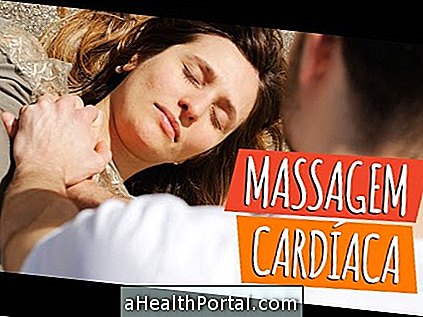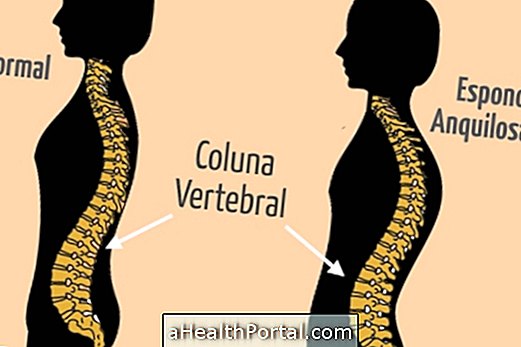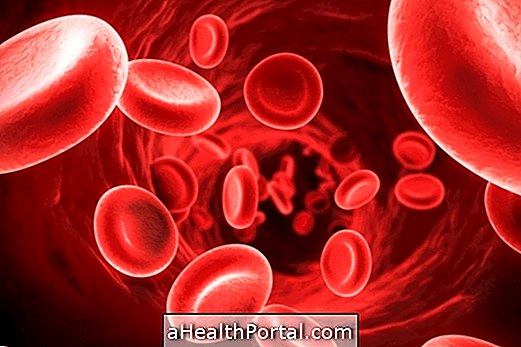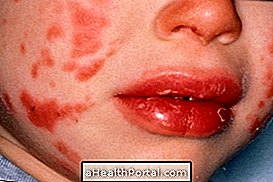There are some factors that can cause tingling and numbness in the tongue and mouth, which are usually not serious and the treatment is relatively simple.
However, there are signs and symptoms to watch out for to prevent diseases that can be caused by a deficiency of vitamins and minerals, neurological problems or even sequelae that can result from a stroke, for example.
1. AVC
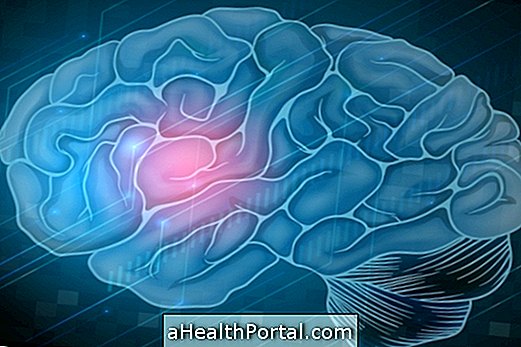
In some cases, the tongue may become numb or have a tingling sensation during a stroke. In this case, other symptoms that may occur are severe headache, decreased strength on one side of the body and difficulty lifting one arm and remain standing, loss of sensation, changes in vision, asymmetrical face, swollen speech, confusion mental, nausea and vomiting.
What to do:
If a stroke is suspected, a medical emergency should be called or called immediately. See how stroke treatment and recovery is done and what rehabilitation is to decrease sequelae.
2. Food allergy

A food allergy can cause a tingling sensation, numbness and swelling in the mouth, tongue and lips, canker sores and throat discomfort. In addition, other symptoms that appear on the skin, such as itching and redness or gastrointestinal discomfort, such as abdominal pain, excessive gas, vomiting, diarrhea, or constipation may occur. Learn about the causes and how to identify a food allergy.
What to do:
Treatment for food allergy depends on the severity of the symptoms and generally the acute cases are treated with antihistamine remedies, such as ebastine, loratadine or cetirizine, for example corticoids such as prednisolone or deflazacort, for example, and bronchodilators. In severe cases, where anaphylaxis occurs, adrenaline should be given.
In addition, it is very important to identify which foods that trigger food allergies and remove them from food and be very careful when eating out.
3. Hypocalcemia

Hypocalcemia is the decrease in calcium levels in the blood which, most of the time, does not cause any type of symptom. However, when the amount of calcium is too low, severe symptoms such as muscle spasms, mental confusion, seizures, and tingling of the mouth and hands can occur.
This deficiency in calcium may be caused by vitamin D deficiency, hypoparathyroidism, low calcium intake or malabsorption, kidney disease, alcoholism, and some medications.
What to do:
Treatment of hypocalcemia depends on cause, severity and symptoms. When there is severe hypocalcaemia and symptoms, calcium should be replaced with calcium gluconate or calcium chloride, for example, until symptoms are relieved. If it is lighter, foods and supplements with calcium may be indicated. Here's a list of calcium-rich foods.
In addition, the cause should also be investigated and resolved, which may include replacement of magnesium, vitamin D, and treatment of renal or parathyroid problems.
4. Deficiency in vitamin B

Some of the most frequent symptoms of lack of B vitamins are easy tiredness, irritability, inflammation and tingling in the mouth and tongue and headache, which can be caused by insufficient food intake with these vitamins or by taking some medication that prevent its absorption. See other symptoms that may be caused by deficiency in Vitamins B complex.
What to do:
The treatment of deficiency in B vitamins should be done by increasing the intake of foods containing these vitamins and dietary supplements. If it is a severe deficiency of any of these vitamins, there are also medicines that can be prescribed by the doctor.
Some of these vitamins, such as B12 and B9, are essential in pregnancy and your needs are increased, so it is very important to take a supplement during this phase.
5. Medications

Some medicines with anesthetics such as mouthwash, throat lozenges, tooth pain sprays or anesthetic drugs used by the dentist usually cause numbness and tingling in the mouth and tongue.
What to do:
If the discomfort caused by products containing anesthetics is too great, its use can be avoided and replaced with others that do not contain anesthetics in the composition. However, usually the numb mouth feel caused by anesthetics does not last very long.
6. Migraine

In addition to the severe headache caused by migraine, tingling in the arms, lips and tongue, sensitivity to light, nausea and vomiting may still occur. See other symptoms that may be caused by migraine.
What to do:
The treatment of migraine depends on the symptoms and must be indicated by a neurologist, who can prescribe some medicines like Ibuprofen, Zomig, Migrétil or Enxak for example, to relieve pain and other symptoms.
To treat migraine effectively and in advance, it is very important to learn to recognize the first symptoms that normally precede a headache, such as a feeling of malaise, neck pain, mild dizziness or sensitivity to light, smell or noise and to start treatment immediately.
7. Anxiety and Stress

Some people who suffer from stress and anxiety may feel a slight tingling in the tongue, which can lead to more anxiety and panic. Other characteristic symptoms are constant fear, bellyache, dizziness, insomnia, dry mouth or muscle tension, for example. Learn to recognize the symptoms of anxiety and possible causes.
What to do:
People suffering from constant stress and anxiety should consult a doctor or a psychologist in order to understand which treatment is most appropriate, which can be done with therapy, natural remedies or in more severe cases, anxiolytic remedies. Watch the following video to learn what to eat to help control this problem:


